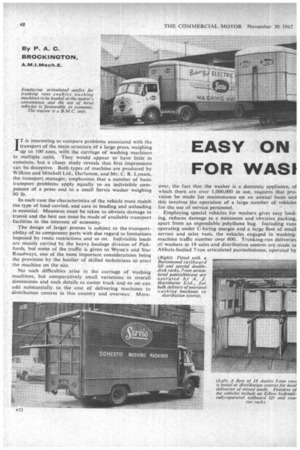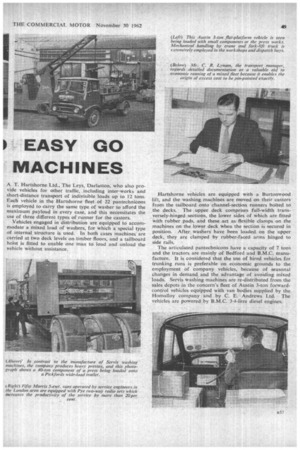EASY ON EASY GO FOR WAS I MACHINES
Page 50

Page 51

If you've noticed an error in this article please click here to report it so we can fix it.
IT is interesting to compare problems associated with the transport of the main structure of a large press, weighing up tO 100 .tons, with the carriage of washing machines in multiple units. They would appear to have little in common; but a closer study reveals that first impressions can be deceptive. Both types of machine are produced by Wilkins and Mitchell Ltd., Darlaston, and Mr. C. R. Lynam, the transport manager, emphasizes that a number of basic transport problems apply equally to an indivisible component of a press and to a small Servis washer weighing 90 lb.
In each case the characteristics of the vehicle must match. the type of load carried, and care in loading and unloading is essential. Measures must be taken to obviate damage in transit and the best use must be made of available transport facilities in the interests of economy.
The design of larger presses is subject to the transportability of its component parts with due regard to limitations imposed by route restrictions and so on. Indivisible loads are mainly carried by the heavy haulage division of Pickfords, but some of the traffic is given to Wynn's and Star Roadways, one of the most important considerations being the provision by the haulier of skilled technicians to erect the machine on the site.
No such difficulties arise in the carriage of washing machines, but comparatively small variations in overall dimensions and such details as castor track and so on can add substantially, to the cost of delivering machines to distribution centres in this country and overseas. More over, the fact that• the washer is a domestic appliance, of which there are over 1,000,000 in use, requires that provision be made for maintenance on an annual basis and this involves the operation of a large number of vehicles for the use of service personnel.
Employing special vehicles for washers gives easy loading, reduces damage to a minimum and obviates packing, apart from an expendable polythene bag. Including vans operating under C-hiring margin and a large fleet of small service and sales vans, the vehicles engaged in washingmachine traffic number over 600. Trunking-run deliveries of washers to 19 sales and distribution centres are made in Abbots-bodied 7-ton articulated pantechnicons. oPerated by A. T. Hartshorne Ltd., The Leys, Darlaston, who also provide vehicles for other traffic, including inter-works and short-distance transport of indivisible loads up to 12 tons. Each vehicle in the Hartshorne fleet of 22 pantechnicons is employed to carry the same type of washer to afford the maximum payload in every case, and this necessitates the use of three different types of runner for the castors.
Vehicles engaged in distribution are equipped to accommodate a mixed load of washers, for which a special type of internal structure is used. In both cases machines are carried at two deck levels on timber floors, and a tailboard hoist is fitted to enable one man to load and unload the vehicle without assistance, Hartshorne vehicles are equipped with a Burtonwood lift, and the washing machines are moved on their castors from the tailboard onto channel-section runners bolted to the decks. The upper deck comprises full-width transversely-hinged sections, the lower sides of which are fitted With rubber pads, and these act as flexible clamps on the machines on the lower deck when the section is secured in position. After washers have been loaded on the upper deck, they are clamped by rubber-faced arms hinged to side rails.
The articulated pantechnicons have a capacity of 7 tons and the tractors are mainly of Bedford and B.M.C. manufacture. It is considered that the use of hired vehicles for trunking runs is preferable on economic grounds to the employment Of company vehicles, because of seasonal changes in demand, and the advantage of avoiding mixed Loads. Servis washing machines are re-distributed from the sales depots in the concern's fleet of Austin 3-ton forwardcontrol vehicles equipped with van bodies supplied by the Homalloy company and by C. E. Andrews Ltd. The vehicles are powered by B.M.C. 3-4-litre diesel engines.




































































































